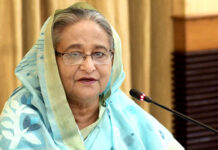“Quietly Crushing a Democracy: Millions in Trial in Bangladesh,” wrote the influential New York Times on September 2, 2023. “Bangladesh’s multiparty democracy is being methodically strangled in crowded courtrooms across this country of 170 million people.”
The Coalition for Human Rights & Democracy in Bangladesh (CHRD Bangladesh) fully concurs with the views of The New York Times and demands that such judicial harassment of the opposition in particular and the people at large must be stopped forthwith in Bangladesh.
Nearly 15 years in office, Prime Minister Sheikh Hasina has captured all the controlling institutions and agencies in the country– including the police, the military and the courts– by filling them with loyal elements and “making clear the consequences for not falling in line,” the NYT asserted. She has wielded these institutions to destroy the political opponents, as well as to accomplish personal vengeance against her enemies. The case of Nobel Laureate Professor Muhammad Yunus is one examples is an example (Please see Statement In Support Of Open Letter From World Leaders To Prime Minister Sheikh Hasina Against The Political Harassment Of Nobel Laureate Professor Muhammad Yunus | ChrdBangladesh Her sole objective is to turn the country into a one-party state. “When a government controls all the levels of power, the media, the courts, and the parliament, it does whatever it can to stay in power,” says Sam Daley-Harris, the founder of the US-based Civic Courage and the anti-poverty RESULT.
The opposition Bangladesh Nationalist Party (BNP) claims that more than 1,500 of its members have been killed by the current government under the leadership of Sheikh Hasina, more than 600 members abducted or killed extra-judicially, more than 100,000 members thrown in prison, more than 4 million members faced false lawsuits, and thousands of its members are unable to go home fearing safety and intimidation. Other opposition parties fare no better.
Thousands, each clamped with largely false charges, stand before the judges on a daily basis, thus creating an immobilizing impact on the opposition for the upcoming election. Saiful Alam Nirob, a BNP parliamentary aspirant, was brought to a magistrate in handcuffs in June 2023 to face nearly 400 vague cases. Khadijatul Kubra, a university student, was charged as an adult when she was only 17 and was later arrested under the detested Digital Security Act (DSA) for a webinar in Facebook. After six denials, she got bail in February 2023, only to be rescinded subsequently by a higher court. Didarul Bhuiyan, an Australia-trained Software Engineer, was arrested for criticizing the government’s corruption with pandemic funds. After months in jail without charge, he was bailed, but faces charges for a Facebook comment that he made one year after his release.
Ashraf Zaman, an activist with the Asian Human Rights Commission (AHRC) explains that the police round up scores of people in one case on such vague charge as “anti-state activities” or “blocking police work,” and leave room to add more by listing dozens or hundreds of “unnamed persons” for the case. By the time the charge is framed, the defendants have already spent months, even years, in jails, at times suffering torture and other related human rights abuses.
CHRD Bangladesh strongly deplores such judicial crimes on the political opposition by the Bangladesh government. It also condemns the intensification of the administration’s all-round authoritarian practices aimed at using, once again, highly fraudulent means to win the fourth consecutive 5-year term in the January 2024 election. The ruling Awami League started inculcating a calculated fear to its loyalists that if the BNP wins, “they will kill us (all),” which CHRD Bangladesh castigates.
CHRD Bangladesh also urges the political opposition to use all its might and efforts to be more proactive. The opposition, particularly the BNP, must be firm on its demands for election under a neutral Caretaker Government (CTG) and not to participate in any further farcical polls under the ruling regime, because it has been established that the current government is incapable of holding a free, fair and participatory election in Bangladesh.










